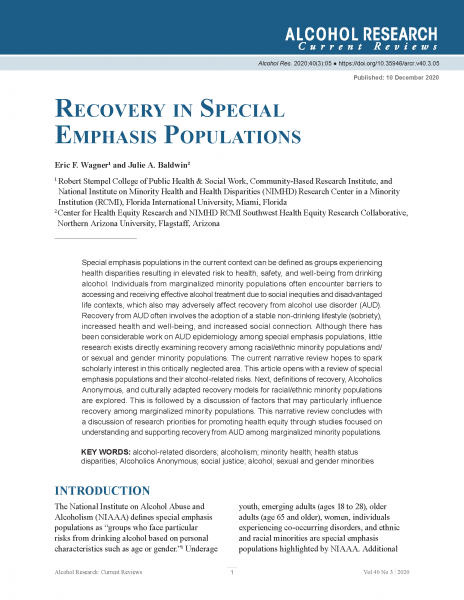Recovery in special emphasis populations
 Special emphasis populations in the current context can be defined as groups experiencing health disparities resulting in elevated risk to health, safety, and well-being from drinking alcohol. Individuals from marginalized minority populations often encounter barriers to accessing and receiving effective alcohol treatment due to social inequities and disadvantaged life contexts, which also may adversely affect recovery from alcohol use disorder (AUD). Recovery from AUD often involves the adoption of a stable non-drinking lifestyle (sobriety), increased health and well-being, and increased social connection. Although there has been considerable work on AUD epidemiology among special emphasis populations, little research exists directly examining recovery among racial/ethnic minority populations and/or sexual and gender minority populations. The current narrative review hopes to spark scholarly interest in this critically neglected area. This article opens with a review of special emphasis populations and their alcohol-related risks. Next, definitions of recovery, Alcoholics Anonymous, and culturally adapted recovery models for racial/ethnic minority populations are explored. This is followed by a discussion of factors that may particularly influence recovery among marginalized minority populations. This narrative review concludes with a discussion of research priorities for promoting health equity through studies focused on understanding and supporting recovery from AUD among marginalized minority populations.
Special emphasis populations in the current context can be defined as groups experiencing health disparities resulting in elevated risk to health, safety, and well-being from drinking alcohol. Individuals from marginalized minority populations often encounter barriers to accessing and receiving effective alcohol treatment due to social inequities and disadvantaged life contexts, which also may adversely affect recovery from alcohol use disorder (AUD). Recovery from AUD often involves the adoption of a stable non-drinking lifestyle (sobriety), increased health and well-being, and increased social connection. Although there has been considerable work on AUD epidemiology among special emphasis populations, little research exists directly examining recovery among racial/ethnic minority populations and/or sexual and gender minority populations. The current narrative review hopes to spark scholarly interest in this critically neglected area. This article opens with a review of special emphasis populations and their alcohol-related risks. Next, definitions of recovery, Alcoholics Anonymous, and culturally adapted recovery models for racial/ethnic minority populations are explored. This is followed by a discussion of factors that may particularly influence recovery among marginalized minority populations. This narrative review concludes with a discussion of research priorities for promoting health equity through studies focused on understanding and supporting recovery from AUD among marginalized minority populations.
Wagner, E. F., & Baldwin, J. A. (2020). Recovery in Special Emphasis Populations. Alcohol Research: Current Reviews, 40(3). doi:10.35946/arcr.v40.3.05

Recent Comments